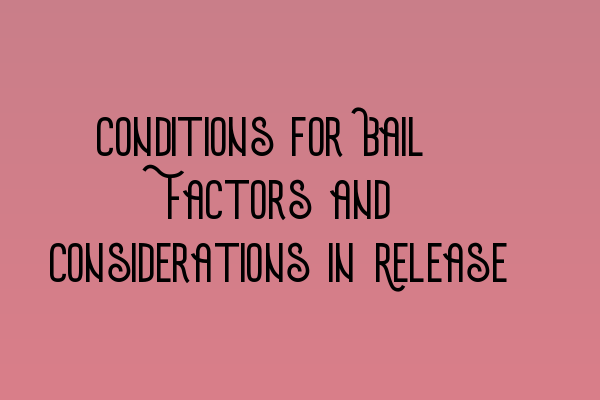Conditions for Bail: Factors and Considerations in Release
Welcome to SQE Criminal Law & Practice Law UK, where we provide valuable insights into the legal field. In this blog post, we will explore the conditions for bail, including the essential factors and considerations that come into play during the release process.
When a person is arrested and charged with a criminal offense, one of the primary considerations is whether they should be granted bail or held in custody until their trial. Bail is essentially a conditional release from custody that allows individuals to await their trial while still being subject to certain conditions.
SQE Sample Papers: Practice for Exam Success
The decision to grant bail is not taken lightly and is dependent on several factors. The court carefully assesses the risk factors associated with releasing an individual before their trial. Some of the critical factors considered include:
- The seriousness of the offense: The nature and severity of the alleged crime are crucial in determining whether bail should be granted. More serious offenses may increase the likelihood of an individual being held in custody.
- The likelihood of reoffending: The court will assess the risk of the defendant committing further offenses while they are out on bail. Previous criminal history and the specific circumstances of the case play a significant role in this determination.
- The risk of flight: The court needs to assess whether the individual poses a flight risk. Factors such as ties to the community, financial resources, and any previous attempts to evade the legal process are taken into account.
- The potential danger to the public: When granting bail, the court must consider the potential risk that the defendant poses to the community. This assessment is crucial for protecting public safety.
- The likelihood of interference with witnesses or evidence: The court needs to ensure that the defendant does not hinder the legal process by tampering with witnesses or destroying evidence. The likelihood of such interference is closely evaluated.
By examining these factors and considering the unique circumstances of each case, the court can make an informed decision regarding bail. The primary goal of bail conditions is to strike a balance between protecting the public and ensuring the defendant’s rights to liberty.
Focus Areas in SQE1 and SQE2: Mastering Key Concepts
Once the court decides to grant bail, it will impose specific conditions that the defendant must adhere to during their release. These conditions are designed to address the concerns identified during the risk assessment process. Some common bail conditions include:
- Regular reporting to a local police station
- Surrendering passports or travel documents
- Restrictions on contacting certain individuals
- Curfews and restrictions on movement
- Participation in rehabilitation or counseling programs
- Financial securities or sureties
It is essential for defendants to comply with their bail conditions. Failure to do so can result in the revocation of bail and the defendant being sent back into custody.
Adjusting Your SQE Strategy Based on Mock Performance
It is crucial to note that bail conditions can be reviewed and varied throughout the course of a criminal case. Changes may be made based on new evidence, the defendant’s behavior, or other circumstances that arise during the legal process.
At SQE Criminal Law & Practice Law UK, we believe in providing comprehensive guidance to aspiring legal professionals. Understanding the factors and considerations involved in granting bail is a fundamental aspect of criminal law. By delving into these concepts, you can develop a strong foundation for your legal career.
Post-Mock Feedback Sessions: Improving Your Performance
If you are preparing for the SQE exams, be sure to check out our SQE sample papers to practice for exam success. Additionally, explore our articles on focus areas in SQE1 and SQE2 and how to adjust your SQE strategy based on mock performance to enhance your understanding and performance.
Practical Legal Skills (PLS) Mocks: Boosting Your Performance
Thank you for reading this blog post on the conditions for bail. We hope you found this information valuable and insightful. Stay tuned for more informative content from SQE Criminal Law & Practice Law UK!
